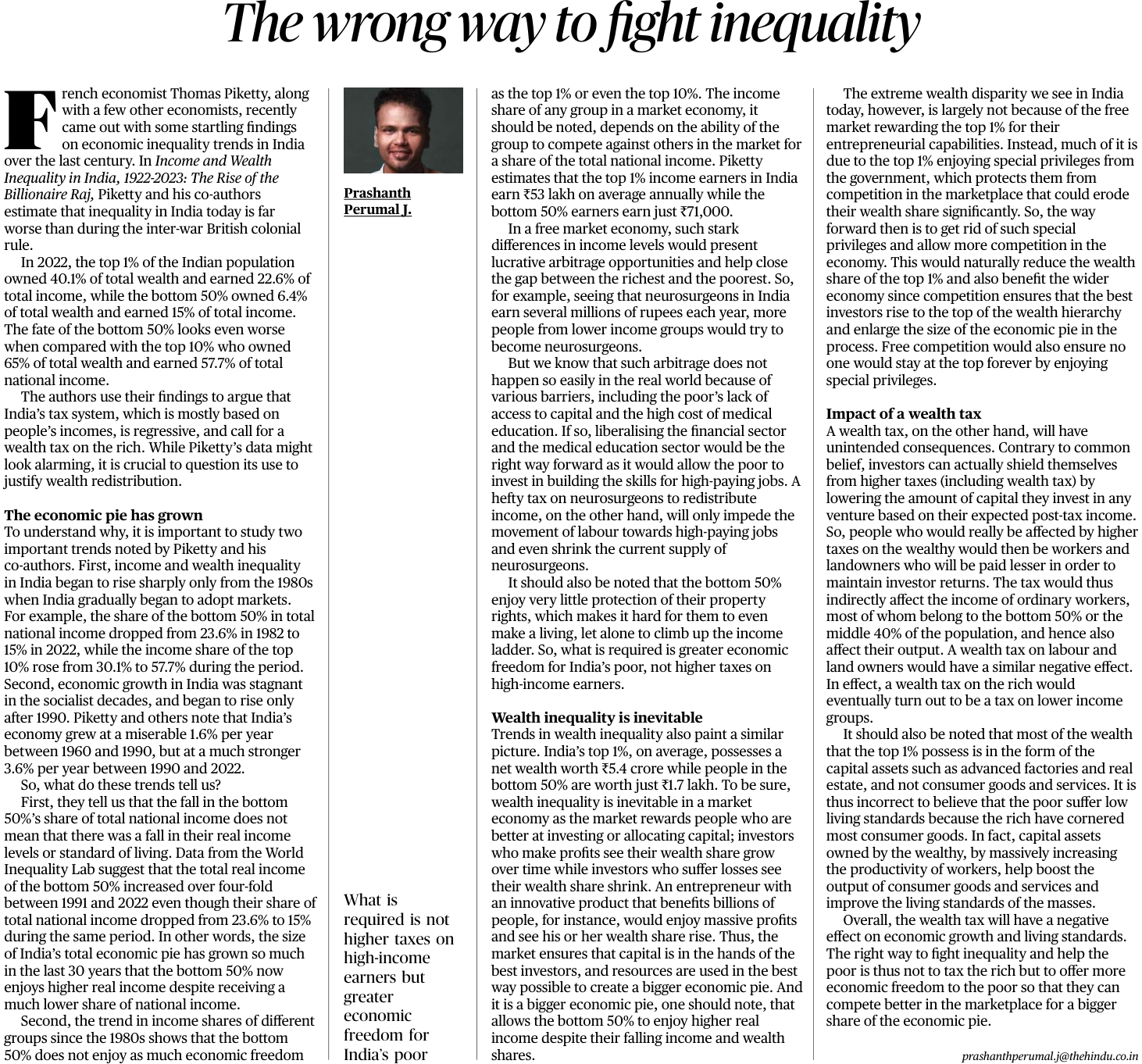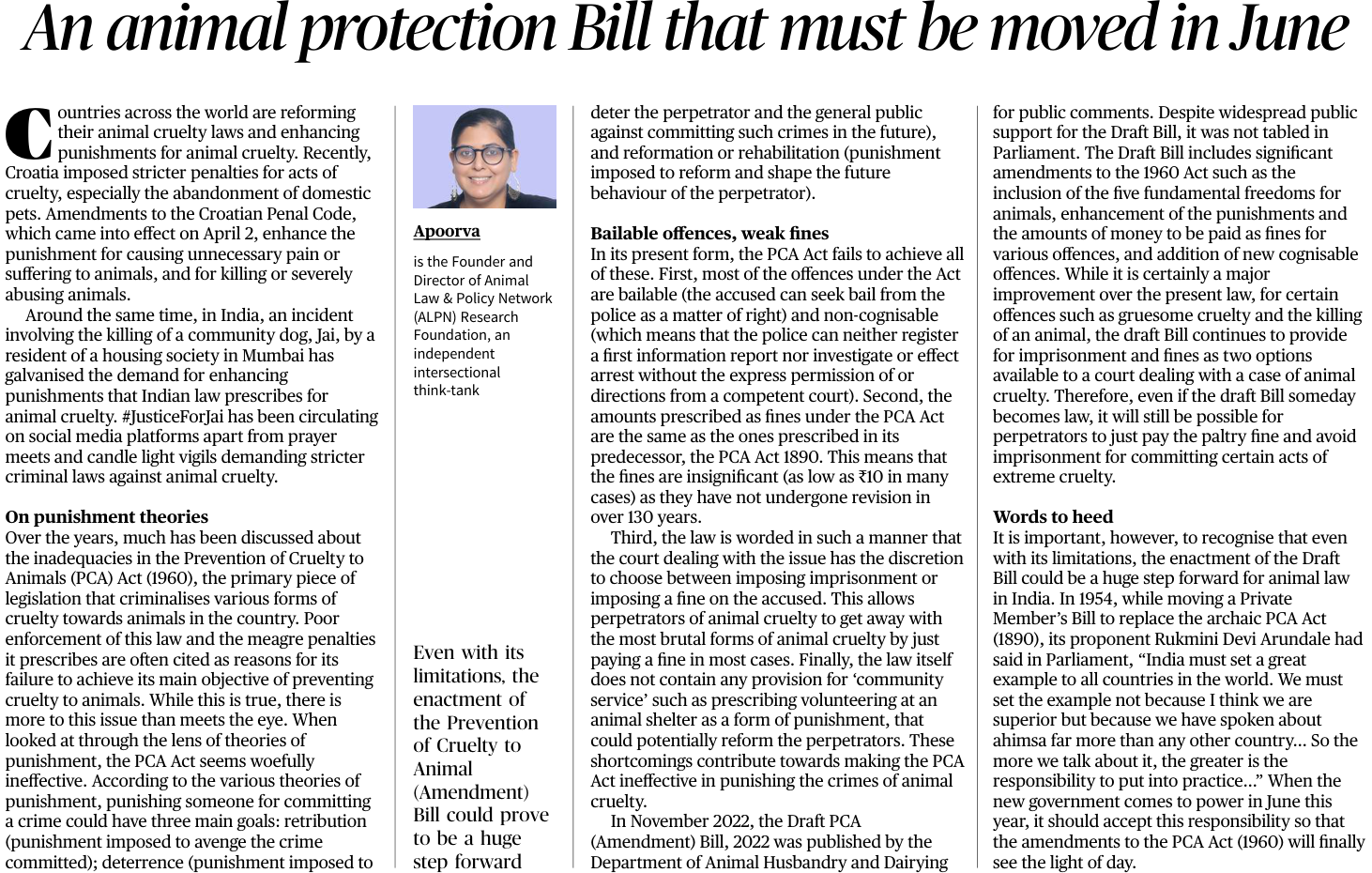 |
|||
| Editorial Analysis
2 May 2024 |
|||
|
Understanding Economic Inequality and the Case Against Wealth Tax in India

Introduction;
- French economist Thomas Piketty and collaborators present a compelling analysis of economic inequality in India from 1922 to 2023 in their work “Income and Wealth Inequality in India, 1922-2023: The Rise of the Billionaire Raj”.
- Their findings reveal stark disparities, prompting discussions about the efficacy of wealth redistribution measures, particularly a wealth tax.
Trends in Income and Wealth Inequality;
- Piketty’s study exposes a widening gap in income and wealth distribution in India, with the top 1% amassing a disproportionate share of wealth and income.
- However, deeper examination reveals nuanced trends: while the bottom 50% experienced a decline in their share of national income, their real income levels have risen significantly.
- This underscores the importance of considering the overall growth of the economic pie.
Barriers to Economic Freedom;
- Despite economic growth, barriers hinder the bottom 50%’s ability to compete effectively in the market.
- Limited access to capital and prohibitive costs of education restrict their mobility, reinforcing income disparities.
- Rather than focusing solely on wealth redistribution, addressing these structural barriers is imperative to foster genuine economic freedom.
Wealth Inequality and Market Dynamics;
- Wealth inequality, an inherent feature of market economies, can be attributed to the market rewarding investment acumen.
- However, the excessive concentration of wealth among the elite is primarily fueled by government-backed privileges, stifling competition.
- Addressing these distortions through increased market competition would naturally rebalance wealth distribution.
Impact of Wealth Tax;
- While a wealth tax may seem an intuitive solution, its repercussions are complex.
- Evidence suggests that such taxes can be evaded or passed onto workers and landowners, ultimately stifling economic growth and exacerbating inequality.
- Moreover, the misconception that wealth primarily comprises consumer goods overlooks its pivotal role in enhancing productivity and, consequently, living standards.
Conclusion;
In conclusion, while the findings of Piketty and colleagues underscore the pressing need to address economic inequality in India, a wealth tax may not be the panacea. Instead, empowering the economically disadvantaged through enhanced market participation and dismantling barriers to opportunity is crucial. By fostering genuine economic freedom and promoting competition, India can chart a more sustainable path towards equitable prosperity.
Reforming Animal Cruelty Laws: Insights from Croatia and India

Introduction;
- Recent developments in Croatia and India highlight a growing global momentum towards reforming animal cruelty laws.
- Croatia’s amendments to its Penal Code and India’s renewed push for stricter punishments reflect evolving societal attitudes towards animal welfare.
On Punishment Theories;
- Examining the issue through the lens of punishment theories reveals the inadequacies of current legislation.
- While punishment aims for retribution, deterrence, and reformation, the Prevention of Cruelty to Animals (PCA) Act in India falls short on all fronts.
Bailable Offences and Weak Fines;
- The PCA Act’s flaws lie in its provisions for bailable offences, insignificant fines, and the absence of community service options.
- These shortcomings undermine the Act’s effectiveness in deterring and reforming perpetrators of animal cruelty.
Draft PCA (Amendment) Bill, 2022;
- Despite public support, the Draft Bill proposes amendments that still allow for fines as a lenient punishment for severe acts of cruelty.
- While a significant improvement over existing law, it remains insufficient in addressing the most egregious forms of animal abuse.
Words to Heed;
- The enactment of the Draft Bill would mark progress in Indian animal law.
- However, it is essential to recognize its limitations and strive for comprehensive reforms that align with India’s cultural values of ahimsa (non-violence) and set a global example in animal welfare.
Conclusion;
The cases of Croatia and India underscore the global imperative to enhance animal cruelty laws. While reforms are underway, there is a need for continual improvement to ensure effective deterrence, rehabilitation of offenders, and protection of animal rights.
Navigating the Global Technology Race: Imperatives for India
Introduction;
- As the world witnesses a surge in technological advancements, India stands at a crucial juncture where technological policy must feature prominently in the national discourse.
- With global powers like China and the United States prioritizing technological dominance, India’s next government must address internal reforms to ensure readiness for the challenges and opportunities posed by emerging technologies.
China’s Technological Ambitions;
- China’s aggressive campaign to master the “new productive forces” underscores its ambition to surpass the US in advanced science and technology.
- President Xi Jinping’s strategic focus on technology-intensive sectors and reducing reliance on foreign technologies reflects a concerted effort to elevate China’s global standing.
Western Investments in Technology;
- The West, particularly the US under President Joe Biden, is aggressively pursuing policies to regain leadership in advanced technology sectors.
- Through legislation and strategic alliances, the US aims to bolster its technological prowess and restrict China’s technological development.
Europe’s Technological Sovereignty;
- European leaders, led by French President Emmanuel Macron, are advocating for bolstering Europe’s industrial and technological sovereignty to compete with the US and China.
- Calls for significant investments in AI, quantum computing, and renewable energy underscore Europe’s determination to reclaim a major spot in global technological power distribution.
India’s Technological Agenda;
- India, under Prime Minister Narendra Modi, has recognized the importance of science and technology in its developmental strategy.
- While Modi’s government has made strides in leveraging digital technologies and renewable energy, there’s a pressing need for a comprehensive overhaul of India’s technology departments and increased investment in R&D to keep pace with global advancements.
Challenges and Imperatives;
- India must address entrenched monopolies in science and technology departments, modernize its technological foundation, and encourage greater private sector participation in research and development.
- These reforms are essential to align India’s technological trajectory with its aspirations of becoming a key player in the global landscape of emerging technologies.
Conclusion;
As the global race for technological supremacy intensifies, India’s next government must prioritize technology policy reforms to position the country as a frontrunner in the “new and high-quality forces of production.” By undertaking sweeping changes and fostering innovation, India can ensure its competitiveness in the rapidly evolving technological landscape.

